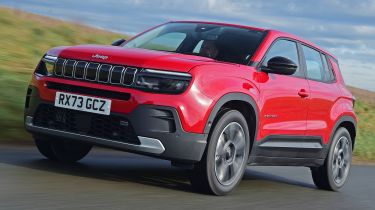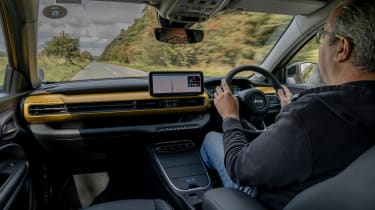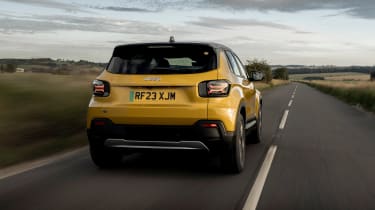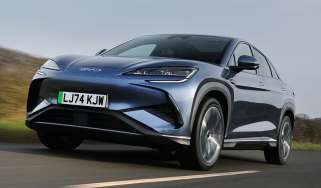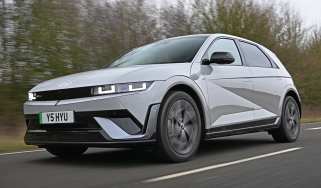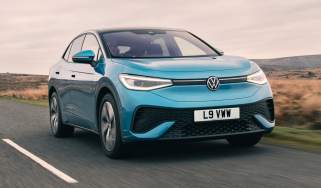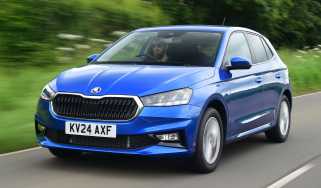Jeep Avenger review – a characterful and value-packed small SUV
“The Jeep Avenger is a refreshing take on the small electric SUV, that also looks like good value”
Pros
- Chunky styling
- Strong tech offering
- Off-road capability
Cons
- Could do with more power
- Some rivals have more range
- Disappointing safety rating
Verdict – is the Jeep Avenger a good car?
Jeep’s first SUV designed for Europe is practical and good to drive, with a distinctive character that’s sorely lacking in some of its electric SUV rivals. The zero-emissions Avenger was quite competitively priced upon arrival, but looks increasingly expensive as more budget SUVs arrive on the scene. Meanwhile, the top Summit edition certainly is pricey, but is loaded with kit. For those not looking to make the switch to an EV, we’ve also now driven the petrol and mild-hybrid versions, with a significantly lower starting price but higher running costs, while the 4xe offers go-anywhere off-roading to small SUV buyers.
Jeep Avenger models, specs and alternatives
For most of us, the first thing that comes to mind when somebody mentions ‘Jeep’ will be high-riding, impractical off-roaders with gas-guzzling engines. It may then come as a surprise that the American brand launched its first-ever electric car, coming in the form of a small road-going crossover called the Jeep Avenger. Now, though, Jeep has diversified the range with more affordable petrol and mild-hybrid versions, while still keeping the focus on efficiency.
 Top 10 best small electric cars 2025
Top 10 best small electric cars 2025
As a result the Avenger now starts from just around £25k for a petrol model, £26k for the e-Hybrid, and the electric version will set you back around £30,000 following a price cut of around £5,000 in late 2024. That’s still a reasonable price gap between the petrol-powered and EV models, but while the petrol or mild-hybrid may seem to make more sense for private buyers, the EV is still likely to be a top pick for company car choosers after a car in a low Benefit-in-Kind (BiK) band, and it comes with all the other running-cost savings of other electric cars.
More reviews
In-depth reviews
Strip away the new Jeep Avenger’s chunky, yet funky exterior and you’ll find the same underpinnings used in the Peugeot 2008 and Vauxhall Mokka, as well as their electric variants, because the brands now all sit under the same Stellantis umbrella. There’s just one battery option available for the electric Avenger: a 54kWh unit (51kWh usable), providing a range of up to 248 miles on a single charge – a bit behind the Hyundai Kona Electric, but competitive nonetheless. Although most of the Avenger range is front-wheel drive, the Avenger has some light off-road capability and some drive modes for mud and snow which differentiate it from its stablemates. The 4xe Hybrid also gains all-wheel drive traction thanks to an electric motor powering the rear wheels.
A 1.2-litre petrol and mild-hybrid version were added later – both get 99bhp and offer a more affordable way into Jeep Avenger ownership. They’re both fairly economical, particularly the e-Hybrid model, which doesn’t cost much more than the standard petrol car and represents the best middle ground for a lot of Avenger buyers.
Compared to the full-fat Jeep Wrangler with its punchy 268bhp petrol engine, the electric Avenger’s single-motor setup may seem a tad underwhelming. However, given electric powertrains produce an inherently large amount of torque, it feels more substantial than you might suspect.
That’s not to say that Jeep has abandoned its off-road heritage for the standard Avenger entirely; it boasts 200mm of ground clearance and comes with a slew of off-road driving modes – Mud, Sand and Snow – meaning it’s more capable than you might expect. However, it’s clear that the Avenger has been designed first and foremost for city streets and this is highlighted by the small SUV’s comfortable and smooth drive.
On the inside, the new Jeep Avenger takes much of its technology from the range-topping Jeep Grand Cherokee. The marque’s latest UConnect infotainment dominates the dashboard and is paired with a fully-digital instrument cluster; all of this makes the Avenger truly feel truly contemporary, with the system itself offering an ergonomic interface and reasonably snappy responses to your inputs.
The Jeep Avenger was tested by Euro NCAP in September 2024 and only achieved a three-star safety rating. While adult occupant protection was fine, it was let down by its child occupant protection and vulnerable road user protection ratings as well as some sub-par responses from its safety assistance systems.
| Trim levels | Power options |
|
|
Jeep Avenger alternatives
If you’re in the market for a small petrol or electric SUV, you’re in luck – it’s one of the hottest areas of the market, with numerous contenders vying for your attention. Even within the Stellantis family there’s a few to choose from, let alone other makes.
- Alfa Romeo Junior
- Citroen e-C3
- Ford Puma
- Kia Niro EV
- Hyundai Kona Electric
- Mazda MX-30
- MINI Aceman
- Peugeot E-2008
- Smart #1
- Vauxhall Mokka
Should you buy a Jeep Avenger?
Some electric cars have been criticised for looking too similar and lacking soul, and if that’s a concern the Jeep Avenger is a welcome antidote. Thanks to its unique styling and bright paint options it looks unique, and we like how it drives and handles, too.
Jeep’s designers have pulled off a neat trick because the Avenger looks a lot bigger in photos than in reality. This is a small car that’s effectively a high-riding supermini and takes up less room than a Volkswagen Golf. That has benefits; it’s the first best Jeep yet for urban adventurers and you’ll have no problem parking. It also means you’ll need to be realistic about how much it can carry, with your passengers’ knees likely to rub the front seats and just a 262-litre boot in the 4xe version.
With a choice of three petrol engines and an electric motor, the Avenger has become more appealing to a broader range of customers since its launch. There’s now even a four-wheel drive 4xe version for those living in rural areas with lots of slippery roads and terrain. However, since a £5,000 price cut in late 2024, we reckon the electric Avenger is the one to go for if your budget can stretch, after which you’ll enjoy the lowest running costs of the lot.
What is the best Jeep Avenger for low running costs?
As mentioned above, you really can’t beat the electric Jeep Avenger when it comes to running costs. While VED (road tax) is no longer free for EVs from April 2025, running costs should still work out considerably cheaper than for petrol versions if you can charge cheaply at home. If you’re a company car chooser, the savings from lower Benefit-in-Kind (BiK) bills will be even more significant.
What is the best Jeep Avenger for keen drivers?
Here it’s a toss-up between the Avenger Electric and the 4xe model, both of which offer more power than the standard 1.2-litre petrol model. The EV version provides the most power and punchiest acceleration of any Avenger, but the 4xe is the only variant of Avenger with four-wheel drive. The latter will help it appeal to anyone looking to venture off-road in the smallest model Jeep offers.
What is the Carbuyer pick of the Jeep Avenger range?
While the version of Avenger you’d go for was largely dictated by your budget, a recent £5,000 price cut on the EV makes this a fairly easy decision. Unless you can’t install a home charger and live miles from the nearest chargepoints, the electric Avenger in mid-level Altitude spec is a great package.
How we tested the Jeep Avenger
We first tested the Jeep Avenger at its international launch event, but have since driven it on multiple occasions on British roads and even ran one as a long-termer.
